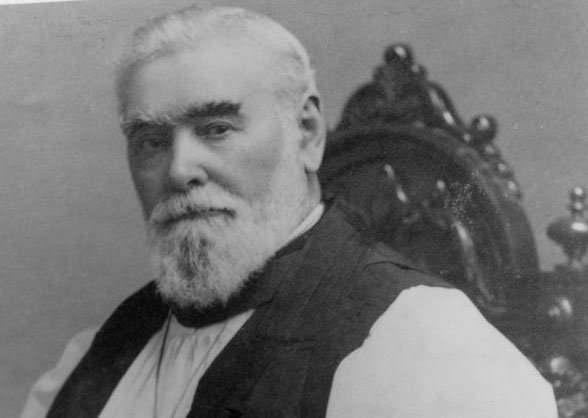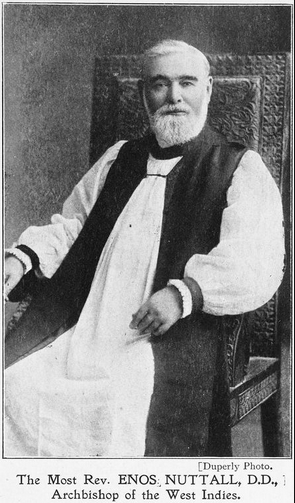The centenary of the death of Archbishop Enos Nuttall is an opportune time to celebrate his life and his contribution, not only to the Anglican Church in Jamaica and in the wider Province of the West Indies, but to the country as a whole. H. G deLisser, the influential Editor of The Gleaner said after his death that “he not only dominated the Church of England in Jamaica for many years, but exercised a most powerful influence on the life of Jamaica as a whole. During the last twenty years of his career – from the age of fifty-four to the age of seventy-four he was certainly the strongest man in the Colony.” Quoted in Frank Cundall, The Life of Enos Nuttall, London, SPCK, 1922 p 228
It was reported that when Archbishop Nuttall died on May 31, 1916, there was a day of national mourning. His funeral held the next day was said to have been the biggest event witnessed in Jamaica for a long time. Life in Kingston came to a virtual standstill as business were places closed so that their employees could pay their respects to the late Archbishop.
Thousands of persons filed pass his coffin as his body lay in state for five hours at George’s Anglican Church where he had served as clergyman before his election as Bishop. Thousands more lined the route to watch the funeral procession travel to the Kingston Parish Church for the funeral service, and then through the city to the St. Andrew Parish Church Cemetery where his body was buried. The service itself was attended by dignitaries of church and state. As the Gleaner report of the event said “It was a funeral the like of which has never been witnessed in this island for a generation.”
Archbishop Nuttall was highly regarded by all sectors of Jamaican society as he was involved in numerous areas of national life, and he was concerned about people’s welfare. In all his activities, he was guided by Christian principles and values and he sought to inculcate these into the members of the society. He was, above all, therefore, a spiritual leader.
SPIRITUAL LEADER
The Fifth Bishop of Jamaica, Enos Nuttall
- was the youngest person to become a Bishop in the history of the Anglican Church in Jamaica, being only38 years old when he was elected in 1880; and he was also the longest serving Diocesan Bishop as he served for 36 years
- played a leading role in drafting the constitution of the Provincial Synod which had its first meeting in Kingston in 1883 and was elected as the second primate in 1893 and the first Archbishop of the West Indies when the designation of the post was changed in 1897
- established and edited in 1867 the Jamaica Church of England Magazine, which was the forerunner of the Jamaica Churchman and The Anglican
- played a leading role (even though he had only been ordained a priest in 1866) in the negotiations which led to the Disestablishment or separation of the Church as an arm of the State in 1870. He was also instrumental in the preparation of the Constitution, Canons and Statutes of the Church; and he helped to implement the Church’s new governance structure by serving as Secretary of Synod and as Secretary of the Diocesan Financial Board
- presided over growth in the Anglican Church after disestablishment as the number of churches increased from 89 prior to disestablishment to 212 in 1900. Membership increased from at least 32,340 in 1884 to 71,900 in 1900
- travelled extensively around the island, chiefly on “buggy and horseback” visiting and consecrating churches, holding confirmations, meeting with church personnel etc. He told Synod, Bishop Evans records in his History of the Diocese of Jamaica (page 41) that, in the first eight years of his episcopacy, his achievements included: “8 Diocesan Synods, 2 Provincial Synods (one of which involved 6 weeks of travelling), 28 ordinations, 20,000 persons confirmed, 11 churches consecrated, 3000 sermons, 1,400 meetings, 40,000 letters and several pamphlets”
- was responsible for collating and publishing in 1893 the first edition of “The Churchman’s Manual,” a book of instruction and devotion for Church members
- was responsible for the establishment of the Deaconess Order in the Diocese in 1890 as he said that “we have a great many female workers in our church who are of great help to our clergy. We need to have the work better organized.” The Deaconesses established the first training programme for nurses with the practical work being done at the Kingston Public Hospital. Later, Deaconesses were also active in the establishment of schools in several parishes. Although most of them were short lived, some– St. Hilda’s Diocesan High School and St. Hugh’s High School – have survived.
- spearheaded the establishment of the Cathedral Chapter at the Cathedral of St. Jago de la Vega in 1899 with the Diocesan Bishop as the Dean, and appointed the first Canons with the Rector of the Cathedral as the Senior Canon. This structure still exists today.
- was instrumental in establishing the Divinity School in 1882, and this soon became the Theological College and then St Peter’s College
- dealt with the greatest natural disaster faced by any Diocesan Bishop as more than 130 church-owned buildings – including the principal churches in Kingston and his home, Bishop’s Lodge – were either damaged or destroyed in the 1907 Earthquake. This destruction was not confined to Kingston but extended as far as Highgate (St. Cyprian’s) and Linstead (Holy Trinity). The damage to the Kingston churches was so extensive that the 1907 Synod had to meet in a tent on the grounds of the Theological College
- established in England an organisation called the ‘Jamaica Church Aid Society’ to provide financial and other assistance to the Church in Jamaica. The Society, which established branches in major cities, raised more than ten thousand pounds sterling for the rebuilding of churches destroyed by the 1907 Earthquake.
- organised local fundraising efforts which were equally successful. In January 1911, ten of the damaged churches were consecrated over a two-week period. The rebuilding and restoration work are still evident in several churches in Kingston, including the St. Andrew Parish Church.
- was very influential in the world-wide Anglican Communion, and in 1901, was a founding member of the Consultative Council chaired by the Archbishop of Canterbury. Over the years, he attended several meetings of the Council, as well as meetings of the Lambeth Conference of Bishops.
ADVOCATE FOR EDUCATION
Archbishop Nuttall contributed to the Church’s rich legacy in education as he
- served as Chairman of the Jamaica Schools Commission and played a leading role in establishing a new Board for the Titchfield School in Port Antonio; in the amalgamation of the Kingston Grammar School with Wolmer’s Boys School; and in drawing up rules for the election of Rhodes Scholars. He was also a member of the Selection Committee.
- assisted in the organization of Mico Training College (now the Mico University College) and served as chairman of the Board of Directors – and before that, the Board of Visitors for 34 years
- was instrumental in the establishment of Shortwood Training College in 1885 to train female teachers, and served as Chairman of the Board until his death
- was a founding member and the first Vice-Chairman of the Board of Education established in 1892 to supervise the development of Primary Education and guide work in the Secondary Education system
- chaired a committee in 1904 comprising representatives of other Protestant denominations in the island and which produced the first edition of a catechism of Christian teachings and values for use in elementary schools
CONCERN FOR HUMAN DEVELOPMENT
The overall welfare of people was a priority for the Archbishop who
- served, at the request of the Governor, as Chairman of the Kingston Restoration Committee established to guide rehabilitation of the City after the devastating 1907 Earthquake. Nuttall was the moving force behind the Committee as he not only drew up a memorandum outlining its objectives, but invited leading merchants and other prominent citizens to serve as members. One of his major achievements was in persuading the British Government to give a grant of 150,000 pounds sterling as well as a loan of 800,000 pounds to assist with the reconstruction work. This was even more remarkable, given the initial reluctance by the British Government to provide financial assistance; as well as the lack of support from the Governor, the Colonial Secretary and the Director of Public Works. Nuttall along with the Crown Solicitor hurried to London to argue the case personally and was successful.
- assisted in the formation of the Jamaica Agricultural Society in 1895 and took a practical interest in its management. It is of interest to note that, when the earthquake occurred on 14 January 1907, the Archbishop was attending the West India Agricultural Conference which was being held in Kingston at the time.
- established in 1908 a nursing home at 116 East Street – which had an operating facility – and was the first private institution of its kind in Kingston. It was known first as a Nursing Hostel and, after his death, as the Archbishop Nuttall Nursing Home. By 1921, there was need to expand the Nursing Home, and land for a new building was purchased at Cross Roads. The Nuttall Memorial Hospital – as it is known today – was officially opened on December 7, 1923.
- established the Belmont Orphanage in 1892 on property which he owned in Stony Hill, and which included a model farm where the girls worked. The first supervisor was his daughter, Clare Nuttall, who while at college in England prepared herself for the duties involved in this post. The Orphanage was closed in 1925 and the Belmont property was sold after the death of Archbishop Nuttall’s widow in 1934.
- was the only British-born Bishop whose family made Jamaica its home. The Archbishop had his own house, Belmont, at Stony Hill. His elder son Ernest, was a solicitor and between 1907 and 1924 was the owner of Vale Royal in Kingston. Ernest’s grandson, Michael Enos Nuttall Costa, who was a well-known attorney and notary public, was the last direct Nuttall descendant living in Jamaica and he died in June 2011, just short of his 83rd birthday.
Prepared by John A. Aarons, Hon Diocesan Archivist



